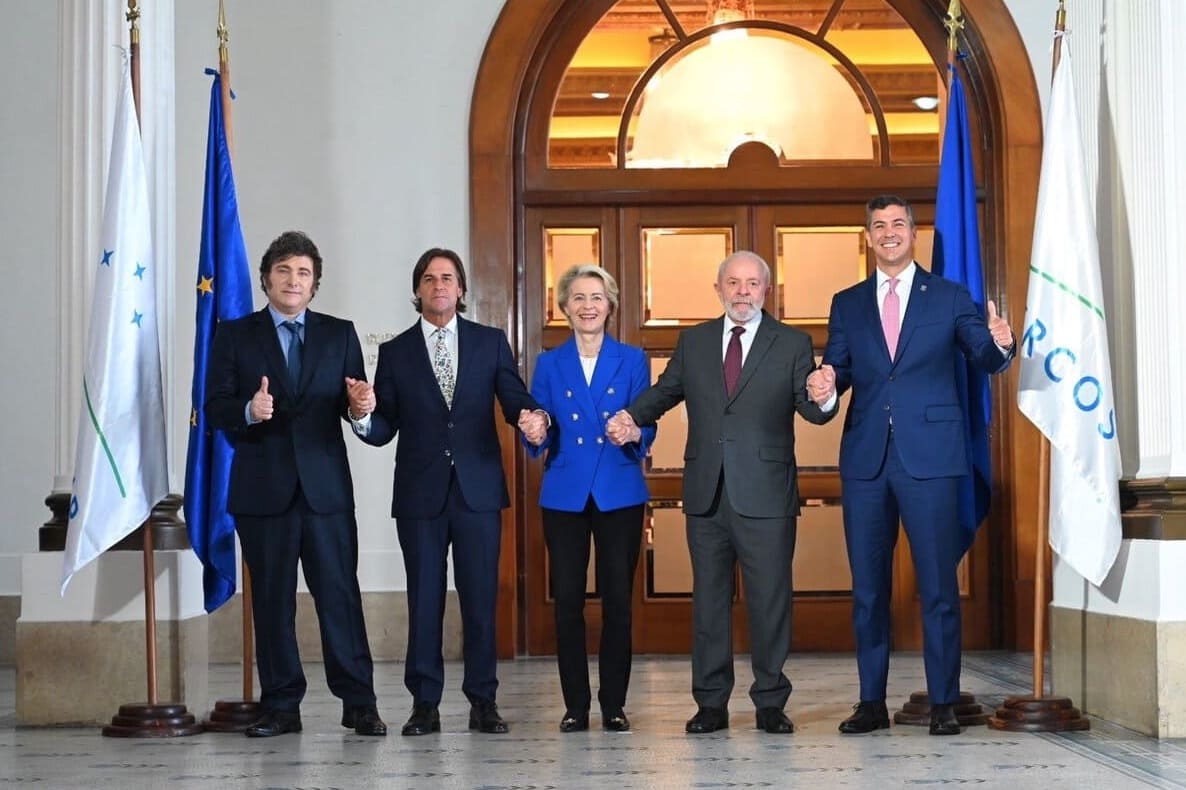
After 25 years of negotiations, the free trade agreement between the EU and the Mercosur countries—Argentina, Brazil, Paraguay, and Uruguay—has been finalized. On December 6, European Commission President Ursula von der Leyen signed the largest trade agreement in the European Union’s history. Only formal ratification by the 27 member states remains, which is not guaranteed, as von der Leyen moved ahead despite criticism from many member countries.
What is the EU-Mercosur Trade Agreement?
To our farmers: we have heard you, listened to your concerns and acted on them.
— Ursula von der Leyen (@vonderleyen) December 6, 2024
This agreement includes robust safeguards to protect your livelihoods ↓ pic.twitter.com/PXRPdkFAR5
What does the EU-Mercosur agreement entail? In summary, it facilitates European manufacturing access to Latin American markets in exchange for privileged access to European markets for South American agricultural products.
Tariff barriers will be removed on 90% of products traded between Europe and Mercosur countries, allowing European goods to reach markets under much more favorable conditions than American or Japanese products.
It is the largest free trade agreement ever reached by the EU, but also one of the most criticized, both by many EU countries (especially France and Poland) and by associations and civil society. Sustainability standards, deforestation, and climate goals have been the key issues that prolonged the negotiations in recent years.
For von der Leyen, everything is resolved, and the EU-Mercosur agreement is solid. She refers to it as a “win-win agreement” that takes into account the “concerns of European farmers” and incorporates “strong guarantees.”
What Does the EU-Mercosur Agreement Cover?
The EU-Mercosur agreement aims to eliminate trade barriers and facilitate exchanges between the two economic blocs, focusing on the following areas:
- Trade in Goods and Services: The agreement covers key sectors such as agrifood, automobiles, pharmaceuticals, financial services, and maritime transport.
- Investments: Promotes fair and transparent conditions for European investors in Mercosur countries.
- Public Procurement: Opens up public procurement markets in Mercosur countries to European businesses.
- Sustainability and Social Rights: Includes specific commitments for climate protection, combating deforestation, and corporate social responsibility.
The free trade agreement creates conditions for preferential market access between the two blocs. European companies will gain access to a market of 273 million people, which had previously been protected by high tariff barriers.
For example, the EU-Mercosur agreement includes the reduction or elimination of tariffs on European products such as automobiles (35%), machinery (14-20%), textiles (35%), wine (up to 35%), and chocolate (20%). In total, tariffs will be removed on about 90% of the products traded between the EU and Mercosur countries.
The agreement also removes restrictive technical regulations, non-automatic import licenses, and complex customs procedures.
At the same time, the agreement includes clauses aimed at ensuring high sustainability standards. The text integrates commitments to environmental protection, workers’ rights, and other sustainability-related issues.
Specifically, the EU-Mercosur agreement (at least nominally) incorporates the respect for the Paris Agreement as the basis for trade and other guarantees to avoid increasing deforestation.
Criticisms of the Free Trade Agreement with Latin America
Civil society has led a long battle against the secrecy surrounding the negotiations. To this day, the text of the agreement is not publicly available, nor have preliminary drafts been made public.
The agreement includes an increase in the EU’s imports of beef, poultry, sugar, and other agricultural products from South America, in exchange for European exports of cars, plastics, and pesticides, including those banned in the EU.
According to Climate Action Network, this exchange fuels deforestation, greenhouse gas emissions, biodiversity loss, and threatens indigenous communities already severely impacted by the climate crisis. At the same time, adding a sustainability annex to the agreement is considered a legally weak choice.
It is also “concerning,” according to Greenpeace Brazil, that the negotiations for the agreement were used “as a bargaining chip to delay and make the EU’s anti-deforestation law more flexible.“
The EU-Mercosur agreement “is opposed by all farmers’ and agricultural workers’ organizations due to its social impact and the denial of the need for sustainable food systems it represents,” comments the European Coordination of Via Campesina. “It also completely contradicts all the national government commitments of the blocs regarding the fight against climate change.“